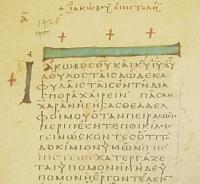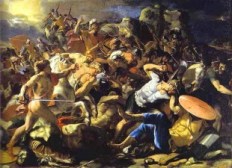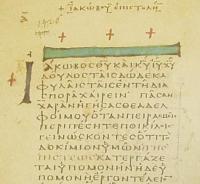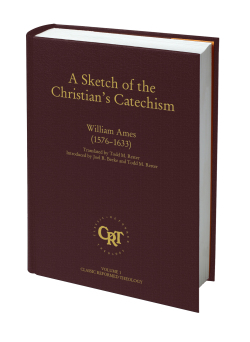"Faith Apart from Works Is Dead" -- James 2:14-26
 Sunday, September 21, 2008 at 05:42PM
Sunday, September 21, 2008 at 05:42PM  Here's the fifth in our series on the Book of James.
Here's the fifth in our series on the Book of James.
Living in Light of Two Ages
____________________________
 Sunday, September 21, 2008 at 05:42PM
Sunday, September 21, 2008 at 05:42PM  Here's the fifth in our series on the Book of James.
Here's the fifth in our series on the Book of James.
 Saturday, September 20, 2008 at 01:26PM
Saturday, September 20, 2008 at 01:26PM  So, if we tweak Newton's "end-time calculator," we come up with a date of 2013 for the second advent . . . Does any of this sound familiar? "Because of how the prophet Daniel divided the prophetic week in half, Flynn
[the author who tweaks Newton's formula] believes the original founding date for the empire of the prophecy, Rome, would
follow this pattern and be bisected. Therefore, correcting Newton's date, the
year 753 B.C. designates the founding of the physical Rome while A.D. 753
establishes the rebirth of spiritual Rome. Counting 1,260 years forward from
A.D. 753, one arrives at the year 2013." And WorldNetDaily just keeps cranking this stuff out. Amazing. Click
here: Newton's end times calculation corrected!
So, if we tweak Newton's "end-time calculator," we come up with a date of 2013 for the second advent . . . Does any of this sound familiar? "Because of how the prophet Daniel divided the prophetic week in half, Flynn
[the author who tweaks Newton's formula] believes the original founding date for the empire of the prophecy, Rome, would
follow this pattern and be bisected. Therefore, correcting Newton's date, the
year 753 B.C. designates the founding of the physical Rome while A.D. 753
establishes the rebirth of spiritual Rome. Counting 1,260 years forward from
A.D. 753, one arrives at the year 2013." And WorldNetDaily just keeps cranking this stuff out. Amazing. Click
here: Newton's end times calculation corrected!
For a secular culture such as ours--which has such a hard time believing the basic facts of the gospel and the Christian faith--it is a bit surprising that we remain so superstitious as a nation. 55% of American adults claim they have been touched by an angel. If an angel ever "touches" me, I'll need to change my clothes! Click here: Touched by an angel? Most say they've been protected - USATODAY.com
Don't you just hate it when your prized relic turns out to be 19th century trinket? Click here: FOXNews.com - Revered Christian Artifact Turns Out to Be Fake - Science News | Science & Technology | Technology N
I've always had a lot of respect for firemen. But mouth to mouth to a cat? Hmmm . . . Click here: FOXNews.com - Firefighter Saves Cat With Mouth-to-Mouth Resuscitation - Local News | News Articles | National News
 Thursday, September 18, 2008 at 05:20PM
Thursday, September 18, 2008 at 05:20PM  Article 5: The Mandate to Proclaim the Gospel to All
Article 5: The Mandate to Proclaim the Gospel to All
Moreover, it is the promise of the gospel that whoever believes in Christ crucified shall not perish but have eternal life. This promise, together with the command to repent and believe, ought to be announced and declared without differentiation or discrimination to all nations and people, to whom God in his good pleasure sends the gospel.
_______________________________________
Having labored in articles 1-4 to establish the point that the purpose of the death of Christ is to be found in the satisfaction of God’s wrath toward sinners who have sinned against his infinite holiness, the authors now move on to make the point that the very nature of the saving work of Christ demands that it be proclaimed to sinners everywhere. This is because the proclamation of the cross of Christ (i.e., the gosepl) is the primary means by which God calls his elect to faith.
As we saw under article 3 of the first head of doctrine, the Canons make the point that God has not only ordained the ends (who will be saved), he has also ordained the means by which he will save them, and that is through the preaching of the gospel. As we have seen, the Scriptures themselves connect the end (the salvation of God’s elect), with the means by which God saves his elect (the death of his only begotten son, whose shed blood is more precious then gold or silver).
It is clear that the death of Christ is the only possible means by which God’s anger towards sinners can be satisfied and turned away from them. Therefore, it is the gospel--which is defined by Paul as the proclamation of the death, burial and resurrection of Jesus Christ (1 Corinthians 15:1-8) in such a way that Christ’s death is publically placarded before sinners (Galatians 3:1)--which must be proclaimed to sinners. This is so that sinners might understand that God’s anger toward them is satisfied only by the death of Christ. This is so that sinners may trust in the satisfaction of Christ to save them from God’s anger toward their sin. This is so that sinners might receive the forgiveness of sins, and the free gift of eternal life.
To put it more simply, God's end—the salvation of his elect—determines the means of saving the elect. It is the death of Christ which assuages God’s holy anger towards sin in a display of his justice and mercy. Since the only way any can be saved is through the death of Christ for them and in their place, this gospel must be preached to all nations (people) without exception. Since God has determined to save his elect through the death of his son, this necessitates that the gospel be preached to all so that God’s elect, scattered throughout all the nations, might come to faith in Jesus Christ and thereby be saved from God’s wrath to come.
Sadly, it is so commonly argued that if you believe in the Reformed conception of election, you will inevitably depreciate the need for evangelism, I am afraid that many Reformed Christians have tragically come to believe the falsehood foisted upon them by the other side. There are indeed a number of faithful Reformed churches and missionary organizations, yet sadly, the Reformed do not have a reputation for being “evangelistic.” This is a shame. Let us all endeavor to do better.
But apart from the question “How are the Reformed doing at evangelism today?” let us be careful not to forget that the real question here is, “How does the Reformed view of election affect the Reformed view of evangelism?” As is clear from the Canons, the Reformed believe that election and the preaching of the gospel are necessarily connected in terms of divinely appointed ends and means. The Reformed should, therefore, be quite zealous to see the gospel preached to their neighbors as well as to the nations. When the Reformed neglect evangelism, they are not being faithful to their own confessions and heritage.
Thus the two great errors which arise at this point are the error of neglecting evangelism—of which the Reformed are often times guilty—and the error of basing the success of the evangelistic enterprise upon the ability of the fallen human will and not in the sovereign power of God which is made manifest in the preaching of Christ crucified. This latter error has moved much of Christ’s church away from a cross-centered faith to an enticement, entertainment-centered faith.
This change in emphasis has produced a host of problems, from the altar call to the mass evangelistic crusade which takes places apart from the auspices of a local congregation and the means of grace. Whenever this enticement-entertainment approach is adopted, the emphasis inevitably falls upon the enticements themselves and there is always a subtle but real tendency to manipulate people to respond to the stimuli. The focus is no longer upon a clear and faithful proclamation of the saving work of Christ in which the hope of effective evangelism is grounded upon God’s grace and power. Instead, too often we trust in the natural ability of fallen men and women to come to faith if enticed to do so.
As Reformed Christians let us carefully take note of what our confessions teach about the relationship between election and evangelism, namely that “it is the promise of the gospel that whoever believes in Christ crucified shall not perish but have eternal life. This promise, together with the command to repent and believe, ought to be announced and declared without differentiation or discrimination to all nations and people, to whom God in his good pleasure sends the gospel.” It is the Paul who teaches us that the gospel is the power of God for the salvation of whoever believes (Romans 1:18; 1 Corinthians 1:17). Thus we must place our confidence in the proclamation of the saving work of Christ, if we wish to see men and women come to faith in the Savior. If we believe in total depravity and unconditional election, we must equally believe in the centrality of the preaching of Christ crucified, since of these things are necessarily connected.
 Wednesday, September 17, 2008 at 11:35AM
Wednesday, September 17, 2008 at 11:35AM  The Nineteenth (and Concluding) in a Series of Sermons on the Book of Joshua
The Nineteenth (and Concluding) in a Series of Sermons on the Book of Joshua
Joshua knows that he is soon to die. But before he goes to be with the LORD, there is one very important thing he must yet do. As Israel’s covenant mediator, Joshua must call the people of Israel to assemble at Shechem, the ancient home of Abraham and Jacob and that place where the entire nation of Israel renewed their covenant with YHWH (Joshua 8:30-35) shortly after they entered the land of promise. Since the nation of Israel was established at Mount Sinai as a covenant community, Israel must renew their covenant with YHWH before the covenant mediator dies. Joshua will remind all Israel of what the LORD has done for them, before the people swear their oath of covenant allegiance to YHWH with the words “we will serve the LORD.” Joshua knows that his impending death means that Israel will soon enter a new chapter in redemptive history. This covenant renewal ceremony will be a fitting end to the life of a man who has served faithfully served the LORD and led his people into the land of promise.
We conclude our time in the Book of Joshua. Lord willing, next Sunday, we will turn to the Book of Judges. As we will see, Israel’s situation changes greatly as slowly but surely the people begin to drift away from the LORD and begin to do what is evil in his sight (Judges 2:11). But even as a new chapter in the redemptive drama is soon to unfold, the present chapter in Israel must come to an end. Throughout our study of Joshua we have followed the people of Israel from those days in which they were still camped on the plains of Moab across the Jordan River from Canaan until that time when they finally conquered the land of Canaan and drove out the Canaanites. Throughout this period in Israel’s history, Joshua has been the covenant mediator, Israel’s leader and the general of the army. As I have pointed out, Joshua is a true biblical hero in every sense of the word. Other than one instance in his youth when he was mildly rebuked by Moses (Numbers 11:28), everything else in the narrative depicts Joshua as a man of great faith, a strong and wise leader and a brilliant and courageous general. But Joshua’s impending death means that great changes lie ahead for God’s people–and it falls to Joshua to prepare them for what will come to pass. That means renewing the covenant.
As we saw last time, Joshua summoned the leaders of Israel to remind them of blessing-curse structure of the covenant that YHWH had made with them at Mount Sinai. Joshua pointed out to these men that their greatest fear should be that future generations of Israel would become enamored with pagan religions and that their children would marry outside the faith of Israel. The task of driving out the Canaanites from the fringes of the promised land must be completed so that these pagans cannot exercise any influence upon Israel. The leaders of the nation must be fully aware of severity of the covenant curse. Just as Israel took possession of the land, so too Israel would be cast from the land should the people turn their backs on YHWH and worship and serve other “gods.” YHWH is a jealous God and although he is long-suffering and loves his people, he will not tolerate the people of Israel worshiping and serving other “gods.” And yet, sadly, this is exactly what will happen in Israel in the not too distant future.
To read the rest of this sermon, click here
 Monday, September 15, 2008 at 07:24PM
Monday, September 15, 2008 at 07:24PM  Here's a very interesting list of failed end-times predictions. Other than the usual crud about Jesus predicting the end and it didn't happen, the list is quite interesting. People have been at this a long time. You'd think they'd learn. But they haven't. Click
here: Apocalypse now? 30 days when the world didn't end -Times Online
Here's a very interesting list of failed end-times predictions. Other than the usual crud about Jesus predicting the end and it didn't happen, the list is quite interesting. People have been at this a long time. You'd think they'd learn. But they haven't. Click
here: Apocalypse now? 30 days when the world didn't end -Times Online
So, the Church of Engalnd owes Darwin an apology? At least that is what Rowan Williams (the Archbishop of Canterbury) thinks. I wonder who does his eyebrows? Click
here: Church makes ‘ludicrous’ apology to Charles Darwin - 126 years after his
death | Mail Online
 Sunday, September 14, 2008 at 10:07PM
Sunday, September 14, 2008 at 10:07PM  "Amillennialism is the greatest heresy in the history of the Christian church. . . . It is the big lie."
"Amillennialism is the greatest heresy in the history of the Christian church. . . . It is the big lie."
Leave your guess in the comments section below. Please no google searches or cheating.
 Kim Riddlebarger
Kim Riddlebarger
 This rant is taken from an audio clip from Jack Van Impe which Hank Hanegraaff played for me to get my response when I was a guest on the Bible Answer Man several years ago.
This rant is taken from an audio clip from Jack Van Impe which Hank Hanegraaff played for me to get my response when I was a guest on the Bible Answer Man several years ago.
Someone reminded me of the quote, so here you go!
 Sunday, September 14, 2008 at 06:17PM
Sunday, September 14, 2008 at 06:17PM  Here's the fourth in our current sermon series on the Epistle of James
Here's the fourth in our current sermon series on the Epistle of James
 Thursday, September 11, 2008 at 04:52PM
Thursday, September 11, 2008 at 04:52PM  Article 4: Reasons for This Infinite Value
Article 4: Reasons for This Infinite Value
This death is of such great value and worth for the reason that the person who suffered it is--as was necessary to be our Savior--not only a true and perfectly holy man, but also the only begotten Son of God, of the same eternal and infinite essence with the Father and the Holy Spirit. Another reason is that this death was accompanied by the experience of God's anger and curse, which we by our sins had fully deserved.
_______________________________________
At this point, it is vital to state with some precision what was only implied in the earlier articles. The reason why Jesus’ death can satisfy God’s justice and anger toward our sin, is that Jesus is the God-man who suffers and dies for us, and in our place. Jesus can identify with us, and our sin can be imputed to him since he is one of us in every respect. As true man and the Second Adam, Jesus Christ comes to stand in our place as our representative before God, just as did Adam. But unlike Adam, Jesus Christ passed the test, and endured all temptation without sin.
Since Jesus Christ is also God in human flesh, his death alone is sufficient to bear the Holy God’s wrath in such a way as to satisfy his justice. As we have seen, this is what Scripture means when Paul says, “he became a curse for us.” This is what Peter is proclaiming in his first epistle when he writes, “knowing that you were ransomed from the futile ways inherited from your forefathers, not with perishable things such as silver or gold, but with the precious blood of Christ, like that of a lamb without blemish or spot. . . . He himself bore our sins in his body on the tree, that we might die to sin and live to righteousness. By his wounds you have been healed.” (1 Peter 1:18-19; 2:24).
This simply means that Jesus Christ bore in his own body the penalty of the curse due us for our own sins. Because he is truly God, his sacrifice alone is sufficient for to satisfy God’s justice so that our sins are forgiven. Because Jesus is truly human, he can die for us and in our place. This then is the heart of the biblical teaching about the death of Christ—Christ dying for us and in our place to satisfy the justice of God. This is what the famous doctrine of the “substitutionary atonement” is all about.
It is God’s love for his fallen creatures and his mercy towards his elect which motivates him to send Christ to do what is necessary so that we might be saved. Let us not make the mistake of “neutering God” by making him all love while forgetting the part about him hating all sin. For even the words “God is love,” are meaningless apart from the death of Christ, where we see the second person of the Holy Trinity, having taken to himself a true human nature, suffering unspeakable agony so that God’s anger toward us is turned away.
It is in the cross that we see both the love and the justice of God. Neither is sacrificed, and through Christ’s death, God’s elect are delivered from the guilt and power of sin.
 Wednesday, September 10, 2008 at 02:17PM
Wednesday, September 10, 2008 at 02:17PM  If you haven't seen this yet, be sure to check out Scott Clark's recent announcement regarding a new series of texts entitled "Classic Reformed Theology."
If you haven't seen this yet, be sure to check out Scott Clark's recent announcement regarding a new series of texts entitled "Classic Reformed Theology."
This is an important project that promises to make available in good editions and translations as series of eminent works of Reformed theology from the era of orthodoxy. These volumes will offer students of the Reformed tradition an invaluable resource and will hopefully stimulate interest in the highly refined and carefully defined thought of an era that was formative of the Reformed faith and that assured its intellectual and spiritual vitality for later generations.
 Wednesday, September 10, 2008 at 01:50PM
Wednesday, September 10, 2008 at 01:50PM  The Twenty-Sixth in a Series of Sermons on Paul's Epistle to the Romans
The Twenty-Sixth in a Series of Sermons on Paul's Epistle to the Romans
In order to answer the question, “why is it that Israel is under God’s judgment, even though the gospel went to Israel first and only then to the Gentiles?” Paul has pointed out that God is working out his mysterious purposes through the election of a believing remnant (“true Israel”) chosen from among the whole of Israel (“all Israel,” cf. Romans 9:6). The apostle will now address Israel’s responsibility for rejecting her own Messiah, despite God’s sovereign and merciful purposes. Paul will then draw a sharp contrast between two kinds of righteousness (a justifying righteousness that is by faith), and human righteousness based on works (which condemns).
The main issue with which Paul must deal is Israel’s present condition of unbelief (apistis). In Romans 9:6-29, Paul emphasized God’s sovereignty in showing mercy to all those whom he wills in order to explain why there is a believing remnant of elect Jews (true Israel) with the larger body, national Israel. But now Paul will demonstrate that Israel’s unbelief stems from her own unwillingness to believe. As John Murray once put it: “The emphasis upon the sovereign will of God in the preceding verses does not eliminate human responsibility, nor is the one incompatible with the other.” The reason that all Israel does not believe that Jesus is the promised Messiah is because the people of Israel do not want to believe that Jesus is the Messiah! Instead, Paul’s own beloved people tragically sought righteousness through works of law flowing from a zeal not based upon knowledge.
As Paul has made plain, only those chosen by God and called to faith through the gospel, believe the promise. Those not chosen, willingly remain in their sins, counting upon the supposed righteousness of their own good works to justify them on the last day. Ironically, however, the godless Gentiles embraced the gospel because of God’s mercy, even as the believing remnant among Israel has done so. But sadly, “all Israel” does not believe and as Paul continues to flesh out the fact that while Israel received all of the blessings described earlier in the chapter (vv. 4-5), the nation as a whole stands condemned and under God’s curse. As Paul sees it, Israel, not God, is to blame.
To read the rest of this sermon, click here